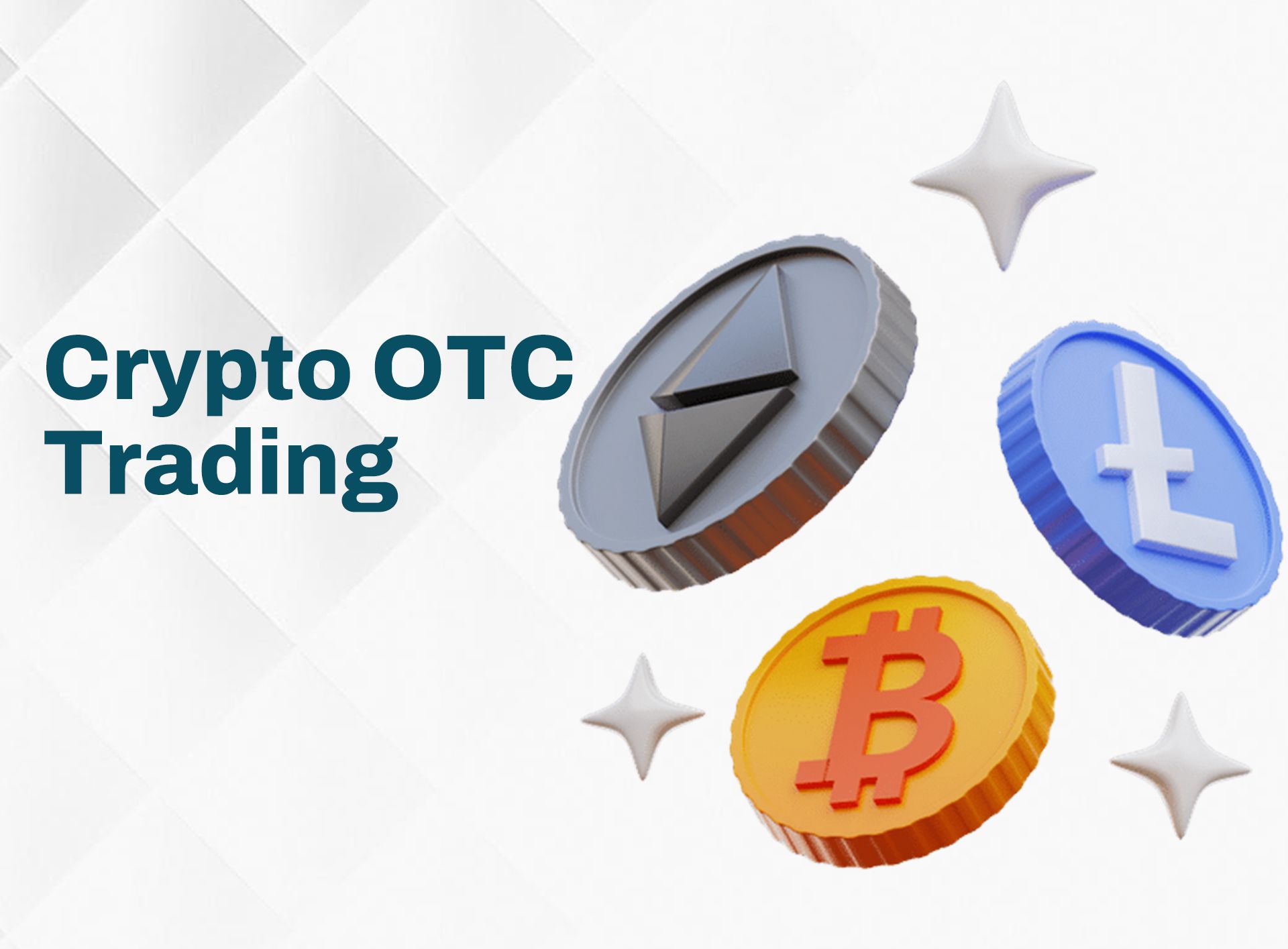TABLE OF CONTENTS:
1. Introduction
2. What is Crypto OTC Trading?
3. How Does Crypto OTC Trading Work?
4. Who are the Key Players in Crypto OTC Trading?
5. Why Choose OTC Trading?
6. Factors Influencing Crypto OTC Trading
7. Tips for Engaging in Crypto OTC Trading
8. Conclusion
9. FAQs
What is Crypto OTC Trading?
Crypto OTC trading, short for Over-The-Counter trading, is a method used by individuals and institutions to buy and sell cryptocurrencies directly with each other, rather than through a traditional exchange.
OTC trading is commonly used for large trades that might not be easily executed on an exchange without causing significant price movements. It offers benefits like increased privacy, faster transactions, and the ability to access liquidity that might not be available on public exchanges.
In 2020, the global OTC trading market for cryptocurrencies was estimated to be around $15.8 trillion, showing its growing importance in the crypto space.
Crypto OTC trading provides an alternative way for investors to manage their trades, especially for those dealing with large volumes of digital assets.
How Does Crypto OTC Trading Work?
The first step to crypto OTC trading is finding a buyer and a seller who want to trade cryptocurrencies. Instead of going through an exchange, OTC traders use a broker who helps them find each other.
The broker's job is to connect buyers and sellers based on what they want – like how much cryptocurrency they want to trade and at what price.
You can also contact an OTC desk and specify the amount of cryptocurrency you want to buy or sell. They then provide you with a quote, including the price and the amount of cryptocurrency you'll receive.
If you're happy with the quote, you can negotiate the terms further, like settling on a price or discussing payment options.
Once the buyer and seller agree on the terms of the trade, like the price and how they'll pay each other, they can start the deal. Unlike exchanges where trades are public, OTC trades are private. That means the details of the trade aren't listed in any public order books.
To make sure everything goes smoothly, there are different ways to settle the trade. They can use bank transfers, escrow services, or even meet in person for big transactions.
Once the trade is executed, it needs to be settled. Settlement involves ensuring that both parties fulfill their obligations as per the agreed terms. This may involve confirming the receipt of funds or cryptocurrencies and updating ownership records.
Who are the Key Players in Crypto OTC Trading?
One of the main players in crypto OTC trading is the OTC desk, which acts as a mediator between buyers and sellers, providing liquidity and ensuring confidentiality. These desks are often operated by cryptocurrency exchanges or specialised firms.
Institutional investors, such as hedge funds, family offices, and high-net-worth individuals, are also major players in the crypto OTC market due to their large trading volumes and need for personalised services.
Market makers are essential participants who help maintain liquidity by constantly providing buy and sell orders.
Another player set is brokers and dealers, who connect buyers with sellers, earning a commission on each trade.
Why Choose OTC Trading?
There are several reasons why individuals and institutions opt for OTC trading:
1. Large Orders: OTC trading allows investors to execute large trades without causing significant price movements in the market.
2. Privacy: OTC trading offers a level of privacy that public exchanges may not provide, as transactions are conducted off-exchange.
3. Tailored Solutions: OTC desks often offer personalised services, catering to the specific needs of their clients.
4. Reduced Slippage: By trading directly with a counterparty, traders can avoid slippage, which occurs when the market moves against their trade while it's being executed.
Factors Influencing Crypto OTC Trading
1. Market Instability:
Due to the crypto market being highly unstable, investors might prefer OTC trading because it offers more stability and privacy than public exchanges.
2. Regulatory Environment:
Some unclear or strict regulations make investors turn to OTC trading to avoid legal issues or uncertainty. So, the clearer and friendlier the regulations, the more likely investors will use public exchanges instead of OTC.
3. Liquidity:
If there's low liquidity in crypto OTC trading, it could be harder to find someone to trade with at a fair price. That's why high liquidity is preferred, as it allows for smoother trading with less impact on prices.
4. Security Concerns:
OTC trading can offer more security because it's done directly between parties, reducing the risk of hacking or fraud that can happen on public exchanges. So, investors may choose OTC trading for peace of mind about the safety of their transactions.
5. Counterparty Risk:
Counterparty risk is the risk that the other party in a trade might not fulfill their side of the deal. In OTC trading, since it's more private and deals are often between trusted parties, this risk might be lower compared to public exchanges where you might not know who you're trading with.
6. Large Transaction Sizes:
OTC trading is often used for large trades because it can handle big volumes without causing huge price swings in the market. Public exchanges might struggle with large trades, leading investors to choose OTC for their big transactions.
Tips for Engaging in Crypto OTC Trading
1. Research Your Counterparty:
Before getting into any OTC trade, thoroughly research the person or entity you're trading with. Check their reputation, track record, and reliability. Look for reviews, testimonials, and any red flags that could signal potential risks. Trust is essential in OTC trading, so take the time to vet your counterparties carefully.
2. Understand Market Dynamics:
Unlike trading on exchanges, OTC markets can have different dynamics and price movements. Stay informed about market trends, liquidity, and price spreads. Familiarise yourself with the factors that influence cryptocurrency prices, such as supply and demand, regulatory developments, and market sentiment. This knowledge will help you make informed decisions and avoid costly mistakes.
3. Negotiate Terms Wisely:
Be clear about your objectives, desired price, and volume before entering into any negotiations. Consider factors like payment methods, transaction timelines, and any additional fees or terms involved. Striking the right deal requires effective communication and negotiation skills, so be prepared to advocate for your interests while finding common ground with your counterparties.
4. Manage Risks Effectively:
As with any investment, OTC trading comes with its own set of risks. Reduce these risks by diversifying your portfolio, setting stop-loss orders, and conducting thorough research. Consider factors like instability, liquidity, and counterparty risk when assessing the potential risks and rewards of each trade. Implementing risk management strategies can help protect your capital and minimise losses.
5. Stay Compliant with Regulations:
Familiarise yourself with the regulatory laws in your country and ensure that your OTC trades comply with relevant regulations, including Know Your Customer (KYC) and Anti-Money Laundering (AML) requirements. Working with reputable and licensed OTC brokers can also help ensure regulatory compliance and protect your assets.
Closing Thoughts
OTC trading offers a personalised and efficient way to buy or sell cryptocurrencies, particularly for those looking to execute large orders or maintain privacy.
While it may not be suitable for everyone, understanding how OTC trading works can empower investors to explore alternative avenues for trading digital assets.
With the global cryptocurrency market continuing to expand rapidly, the importance of OTC trading is only expected to grow, providing essential liquidity and stability to the market.
FAQs
Q1. Is OTC trading legal?
A1. Yes, OTC trading is legal in most jurisdictions, as long as it complies with local regulations.
Q2. Do I need to be an accredited investor to participate in OTC trading?
A2. Not necessarily. While some OTC desks may require investors to meet certain criteria, others may cater to a wider range of clients.
Q3. How do OTC desks make money?
A3. OTC desks typically charge a fee or make money through the spread between the buying and selling price of cryptocurrencies.
Q4. Is OTC trading safe?
A4. Like any financial transaction, OTC trading carries risks. It's essential to conduct due diligence and choose reputable OTC desks.
Q5. Can I buy any cryptocurrency through OTC trading?
A5. Many OTC desks offer a variety of cryptocurrencies for trading, including Bitcoin, Ethereum, and more.
Q6. Are OTC trades anonymous?
A6. While OTC trading provides a level of privacy, transactions may still be subject to regulatory requirements, such as KYC (Know Your Customer) and AML (Anti-Money Laundering) checks.
Q7. How long does an OTC trade take to settle?
A7. Settlement times can vary depending on the agreement between parties and the payment method used.
Q8. Can I trade OTC without using a broker or OTC desk?
A8. While it's technically possible to arrange OTC trades directly with other individuals, using a reputable OTC desk or broker provides added security and convenience.
Q9. Is OTC trading only for large investors?
A9. While OTC trading is popular among institutional investors and high-net-worth individuals, retail traders can also participate, depending on the OTC desk's policies.
Q10. What are the tax implications of OTC trading?
A10. Tax implications vary depending on your jurisdiction and the specific nature of your trades. It's advisable to consult a tax professional for personalised advice.
Disclaimer: This article was written to provide guidance and understanding. It is not an exhaustive article and should not be taken as financial advice. Obiex will not be held liable for your investment decisions.

